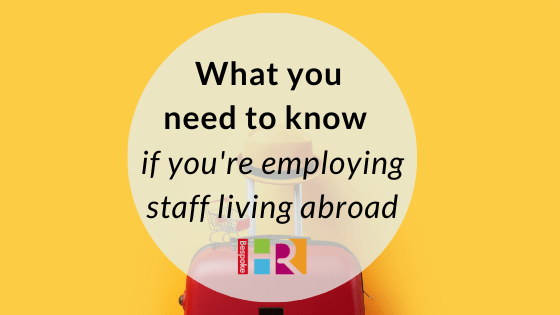As an employer, these are the things you need to know if you’re employing staff living abroad.
In a post lockdown world, where many people have now embraced hybrid working employers are increasingly finding that employees no longer want to work from one base. According to a recent survey, around one in 16 people in the UK (1.9m workers) intend to work from abroad for at least part of this year.
Tax implications and employment law when employing staff living abroad
This is not always as straightforward as you may think. Depending on where your employee is based, they may be subject to the local tax implications and employment law regulations. This can get complicated and we would encourage you to get professional advice to ensure your employee is set up to adhere to them and what your responsibilities are. The risk is that your company could be approached for remuneration by the country’s government they aren’t set up properly. In addition, if there is a dispute with an employee, they may be able to draw on their employment rights within that country. It’s advisable to draw up a contract outside of the UK (see below).
Another point to consider is whether your staff benefits (to those working in the UK) are still applicable to those outside the UK. Can you offer a fair structure to all staff?
Check IR35 rules
If the individual is working solely for you, then they could be deemed as an employee under IR35. Again, this will have tax implications for your business. Read our guide to IR35. You may need to consider a contractor’s agreement if you’re employing staff living abroad.
Contracts
Does your employee have a UK contract? In which case they may not cover them whilst working outside of the UK. It may be better to look at the type of contract and weigh up the best options. For example, are they better off with self-employed / contractor status (see IR35)?
Payroll
Consider how the employee will be paid, will you need to outsource the payroll to a specialist company that is able to make the relevant deductions for the specific country? Factor in the additional cost of doing this.
Insurance
It’s advisable to check your business insurance to ensure it covers employees working in a different country. In addition, if your business provides private health insurance for example, is this still applicable if the employee is outside of the UK? How can they access services?
GDPR
Will your employee be processing data? They will need to be familiar with GDPR rules and also those of the country they are living in?
Are your workers truly remote?
If you have an employee who is travelling then you will need to be aware of all of the above factors for each country they are residing in. Are you able to keep track of their movements and where they are based? The employee should inform you of their location in advance so that you can plan to factor in these elements.
Expenses
Is it clear who will cover any travel costs for the employee if they have to visit the UK for meetings and how regularly you might need them to travel? It’s a good idea to address this upfront to make sure there are no misunderstandings.
For more advice on any of the above, please get in touch with our team.
Download one of our free guides
Sign up for our weekly newsletter
Free tips and advice for your company.
Get 15 mins free HR advice
Book in with one of our HR consultants.
